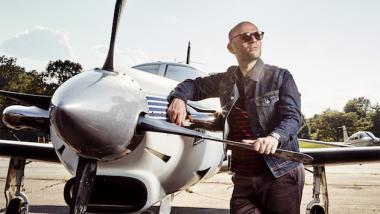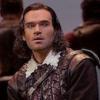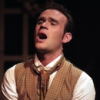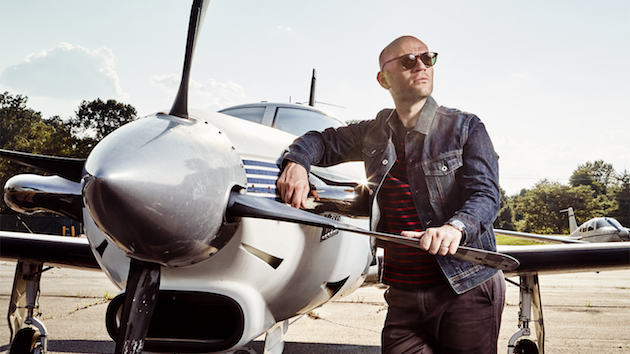
Michael Fabiano’s first memory of classical music is dancing around his childhood living room to a record of the New World Symphony. Though at the time he was more into umpiring baseball and arguing on the debate team, he loved classical music, and from Dvorak to Beethoven, the house was full of it. A third-generation American, Fabiano was briefly featured in the PBS documentary The Italian Americans, and when his close-knit family supported his choice in college to become an opera singer, it did so knowingly. Both parents are singers, and others in the family had attempted careers, from Great Aunt Bee the contralto, to a grandmother who was a concert pianist, to his aunt, soprano Judith Burbank.
These days the family dreams have been realized, and then some. The 34-year-old tenor is enjoying acclaim and success on a grand scale. And “enjoying” is the right word. Fabiano says that performing, as a counterpoint to his many other active interests, “makes for a nice kind of paradise.”
Critics and casting directors the world over agree.
While roles like Rodolfo in La Bohème, the Duke in Rigoletto, and Edgardo in Lucia di Lammermoor are his bread and butter, the ample-voiced tenor often takes on meatier assignments such as the title roles in Verdi’s Don Carlo or Gounod’s Faust, and greater rarities such as Jean in Massenet’s Herodiade or the title role in Donizetti’s Poliuto in its first ever U.K. production, at Glyndebourne. A top tier choice for broadcast and cinematically released productions, Fabiano has performed in the world’s major houses from Dresden to Amsterdam, from Madrid to the Metropolitan, where he is a frequent favorite. San Francisco audiences have appreciated his interpretations of Des Grieux in Manon and Rodolfo in Luisa Miller, among other roles at the opera house, and at the Symphony in Beethoven’s Missa Solemnis and on a night of music by Italian composers.
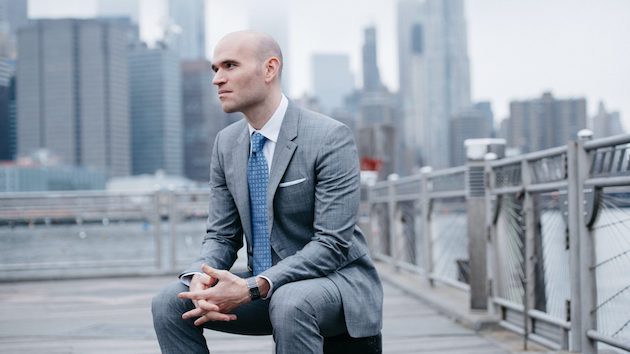
An opera singer in the prime of a successful career can easily spend 10 or more months a year on the road, so where they call “home” can be somewhat theoretical. A New Jersey native, Fabiano is currently based in New York, though the Bay Area undoubtedly holds a special place in the heart of the singer, who is actively planning to have a home here, and cites Michael Tilson Thomas as an important influence. This month Fabiano will be performing at Festival Napa Valley’s celebration of Bernstein’s centennial. “It’s definitely where my heart is,” he says of the Bay Area. “When I come to San Francisco I always calm down, which is the reason it’s where I need to be.”
Fabiano is difficult to pin down in ways other than geography. A thoughtful singer, he is apt to preface his performance posts on social media with a bit of operatic history or character analysis. He has said that as an umpire he had to “show people I had full authority and when I made a decision it was done,” and adds that it’s the same for a singer. “I should show up to rehearsal and know my music perfectly so there is no question.”
His ultra-gloss website befits the only singer to win both the Richard Tucker and the Beverly Sills Artist Awards in the same year, but despite all the impressive credentials, the laser-focused work ethic, and the demanding performing schedule, Fabiano has made the time for other interests, including co-founding ArtSmart, an organization bringing one-on-one voice lessons with professional teachers to underserved student populations, and getting his pilot’s license, of which he seems to make frequent use. He also possesses a fluency in social media that allows him to be truly himself in a very public way, whether proudly sharing the news of his engagement to “the love of my life,” Bryan McCalister, or announcing his busy upcoming season in a Facebook profile video while rowing a boat on the lake in Central Park.
Fabiano sees his rigorous musical preparation and various outside interests as of a piece in contributing to what he achieves onstage. Speaking to SFCV in a phone interview between performances of Lucia di Lammermoor at Opera Australia, Fabiano said,
Discipline and rigor in what one does outside of the stage define how good what happens on the stage is. You can’t just get up on the stage and be great. Maria Callas is famous for working with the great maestro [Tullio] Serafin all the time, and I guarantee that those lessons were not just ‘Maria, you’re great.’ They were ‘let’s try to figure this out.’ I understand that. That’s my world, too. What’s important is, I like the process of it. I’m an ends-based person. I’m a Taurus. I like results. I like consequences. But I also like the process of getting there, and the process for me is a deep examination of how to improve my instrument.”
And the process is ongoing. “The reality is the voice is constantly changing,” he says. “The voice goes in a six-year cycle where there’s six years of growth and then a growth spurt where the singer has to deal with a notable change. At least that’s been my pattern. When I was 18, when I was about 25, and again when I was about 30, or 31.”
When I was 18, I started studying [at the University of Michigan] with George Shirley, the first African-American tenor to sing at the Metropolitan Opera. He started me off singing operatic arias, important music, young, which I think was the correct thing to do because it allowed me to have my voice be open and free. His premise was that young voices should be able to run free like wild horses, and in time you train the voice and kind of put the guard rails up and the rules come into focus about how to sing, and how not to sing.”
When asked about future professional goals he says, “I will continue the track I am on now, which is a full lyric track of opera. I’m not the classic lyric tenor. I am what I am. I accept that. I will be debuting a number of rolls that are interesting, like Hoffmann, these next couple of years that are in line with who I am and where I’m going.” In the past, when pressed to characterize the voice, he has called it “a big lyric instrument that functions well top to bottom.”
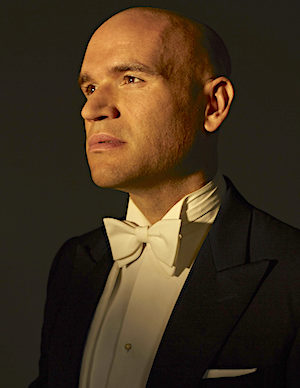
The critics have been less understated. In Opera News, Brian Kellow wrote that Fabiano’s voice has a “generous helping of squillo,” and that the singer has a “visceral stage presence. His energy is so concentrated that he often leaves his colleagues miles behind.” The San Francisco Chronicle’s Joshua Kosman also noted this intensity, “both vocal and dramatic,” writing that the voice was “ringing, impeccably balanced,” and “expressively ardent.” Kosman went on to say that Fabiano had taken “a production that had been teetering perilously on the brink of irrelevance and single-handedly redeemed it.” What these critiques and others have in common is the sense of a singer running ahead of the pack.
Such achievement may be born of an intense practicality on the one hand, and a true lust for artistic liberation on the other. When he was called to step in for an ailing colleague at the Met on hours’ notice, Fabiano informed those at the prestigious house of exactly what he would need to get the job done right, down to the details of the meal he wanted beforehand in his dressing room. Meanwhile, his more ethereal sensibilities are expressed on a social media post in which he extols his love of flying, saying, “Flying frees the mind. Flying frees the soul. Flying reminds me to live in the moment, to be one with myself, and enjoy what’s in front of me. It’s my ground zero even though there is no ground.”
Speaking of Napa, where he has flown many times, he says, “I fly at 3,000, 5,000, 7,000 feet, so I really get the scope. It’s a beautiful and vast space.” Perhaps it is this soaring perspective that allows Fabiano to see beyond his current role as a star tenor. “I do see that singing is one stone to step on in life. It’s not the only stone,” he says. “There are other places to go beyond singing. I think that might be scary for other singers, or musicians, to think beyond singing and teaching, but I don’t think like that. I think my net should be cast wide. I’m conscious that my career is finite, not infinite. There are many other things for me to do within my palette of abilities.”
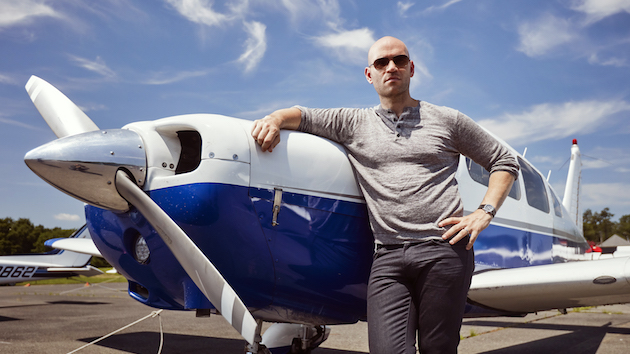
One of those abilities is taking a leadership role in music and arts education, something he says has been hugely deficient in recent years, resulting in less appreciation for classical music. “When I talk to people that don’t know opera, there’s this notion that it’s a porcelain doll, a fetish, a small, niche thing. People outside the genre don’t have any clue what it is,” he says, citing stereotypical images of paper fan wielding Traviatas and horn wearing Brünnhildes. He dubs the proliferation of such remote and incorrect concepts as “otherizing” opera, and this led him, along with his friends John Viscardi and Liz Letak, to found ArtSmart, a foundation which currently has education programs in Newark, Philadelphia, and San Francisco, with hopes to expand. He says:
98.15 percent of Americans who graduate with doctorates or masters have no careers. That’s alarming. People are amassing lots of debt, which means that the universities in which they study are not being honest with them, putting them in the position of debt when they end up scrounging for work. I believe in work there is dignity. That means that we have a lot of people who are not feeling valued, who are living in the red. So how do we solve that? The near-term solution was pairing talented musicians who have advanced degrees with children who need musical services in places where they are underserved
We want to show that the mentor relationship between a younger adult or teenager, and a mentor, will turn a life around. That’s a qualitative improvement, not a quantitative improvement. There’s something special when a child knows that they have one specific person that they can trust with their voice, and learn from. That bond is so impactful that the kids end up wanting to do everything else in school. They want to graduate. They want to study English. This is solvency on two ends. It employs people, and it reignites that fire for this generation of loving culture. At later dates they are our citizen soldiers, whether they are performers or just lovers and connoisseurs of music.
A dozen years ago, film audiences were given an extraordinary glimpse into the singer’s life and the young Fabiano in the documentary The Audition, filmed over the course of the Grand Finals of the Metropolitan Opera’s National Council Auditions. Several of those featured in the film have gone on to major careers, including soprano Angela Meade, and mezzo-soprano Jamie Barton. I asked Fabiano how he is different today from the 22-year-old featured in the film. “I am calmer,” he says.
I realized that when I was young, the notion of singing home runs was really impressive, and now I believe that when you get onstage, a good single can carry the day. A couple of good singles brings in a lot of runs and wins the game, and sometimes a good single can turn into an infield home run. I’ve got to go out there and do my job. I know now, with a 12-year career so far, that not everybody is going to like the instrument, or like me, or approve of how I sing. My burden is not to them. My burden is to be the conduit by which an important instrument is heard by people.
George Shirley always had this as a moral imperative, which I still believe, but didn’t really know early on in my career, that my voice is not my own, it’s everyone’s, and I have to be, as I said, this conduit, that thing that transmits the voice. Now I am much more conscious of that. That means I have a greater responsibility than I knew then, to be priest-like in my decorum, protecting myself and remaining healthy, and doing things that keep my instrument in good shape.
In the film, Fabiano is serious, and focused, which explains why today he has little memory of the camera being there. “It didn’t seem part of the big picture, it just seemed part of the background,” he says.
That was the first year of my real career. I did my debut six months before that film was done. About my younger self, that film tells you all you need to know. I was very hungry, and I think young people should be like that. They should be hungry. They should be ready to tear through and win. Some people did criticize me for the way I conceived of music-making. But I still maintain that this world is hyper-competitive. Anyone who tells me there is no meritocracy in opera, music, or the arts is lying. The public rewards great, it does not reward bad. That’s meritocracy. The public will tell you at the end of the night if you succeeded, leaders of theaters will not rehire people if they do not succeed. That’s meritocracy. It’s capitalistic. It’s what our country is, dare I say. It’s interesting to look back at some of the criticisms I got for being hungry, and I wouldn’t have changed anything. I’m still hungry.
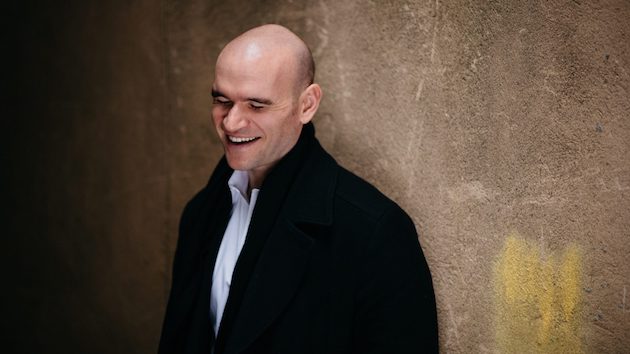
Of the Bernstein’s music for Napa, which he’ll also sing at the Ravinia Festival in Illinois later in the summer, Fabiano says he looks forward to singing such beloved songs from a story he still finds “totally relevant. It’s a historical piece of music, memorable music that people care about to this day,” he says, and goes on to discuss the immigrant, family, and romantic aspects of West Side Story. It is precisely that kind of relevance, he feels, that makes opera so compelling.
We’re talking about real life. The music that is coupled with the dramaturgy of opera actually enhances the drama of so many stories better than so many modern works we know today.” He believes that people in the industry need to do a better job to show that it’s for everybody, “because the stories relate to everybody, every single person. A child, a teenager, a young adult, an older adult. Yes, there are some ridiculous stories. Turandot, OK, that’s not real life. But Aida, it’s about a real person, as Verdi’s operas often are, especially those from the Schiller plays. Don’t make it out to be this niche platform. It’s not. It’s for all sizes, of all colors, of all genders, at all times. And it should be accessible to them in every single platform possible, whether it’s in the theater, television, in the movie theater, or on your Apple TV, because it’s life changing.
Regarding the much-desired home in the Bay Area, Fabiano says, “It’s a matter of how and when. Buying a house and furniture and all of that. I need two months to just focus on it.”
With an aviator’s precision and an opera singer’s determination, it’s a fair bet Fabiano will make that happen, and an even safer bet that when he does, San Francisco Opera will have his number on speed dial.

